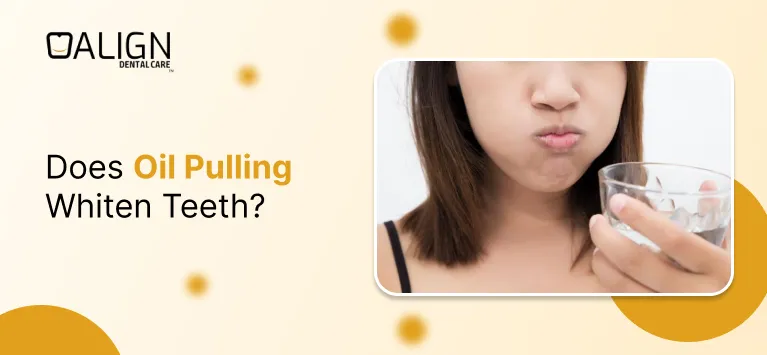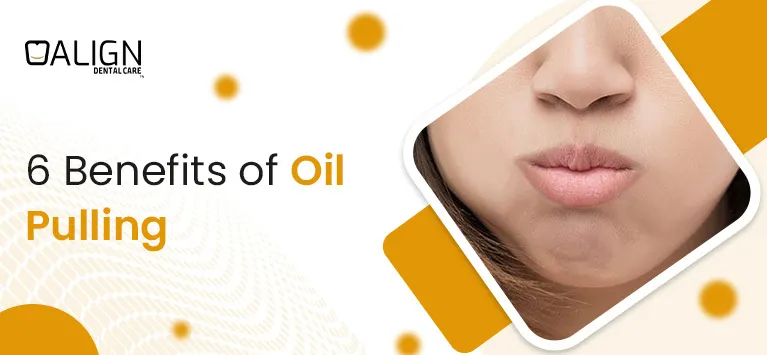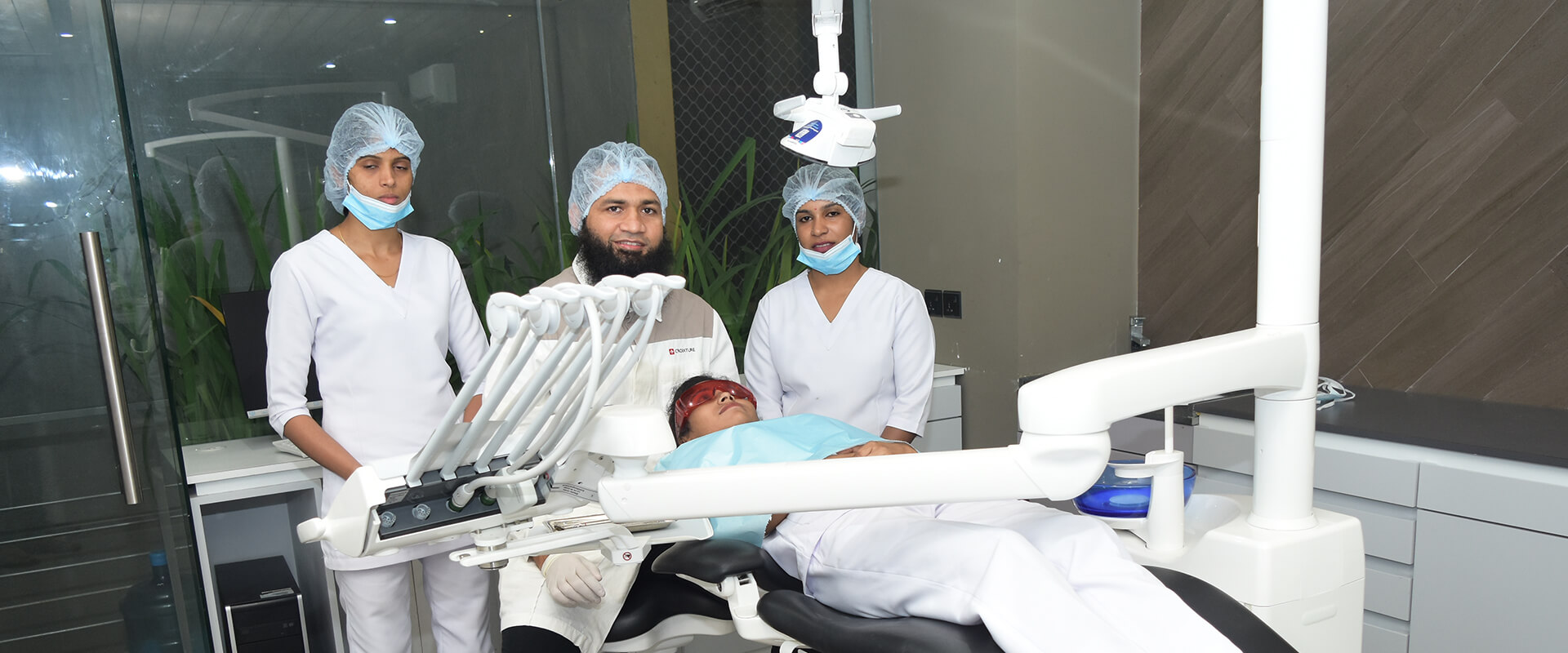Does Oil Pulling Whiten Teeth?

Oil pulling is an ancient practice that has gained modern-day popularity as a natural method to improve oral health. Swishing oil in your mouth is believed to help remove bacteria, plaque, and other impurities, leading to a cleaner mouth and fresher breath. While many people swear by its benefits, a common question remains: does oil pulling actually whiten teeth? In this article, we’ll explore what oil pulling is, how it works, the benefits it offers, and whether it can truly make your teeth whiter.
What is Oil Pulling?
A spoonful of oil, such as coconut oil, is swished in your mouth for 15 to 20 minutes while the oil is pulled. During this time, the oil binds to bacteria, plaque, and other impurities, which are then removed when you spit out the oil. It’s a simple process believed to promote oral health, freshen breath, and potentially reduce surface stains on teeth.
What’s the Origin of Oil Pulling?
Oil pulling is an ancient Ayurvedic practice dating back thousands of years. Originally from India, it was used as a traditional remedy to detoxify the body, improve oral health, and balance overall health. Traditionally, sesame oil was the most commonly used oil for this practice. Coconut oil gained popularity later due to its natural antibacterial properties, mild flavor, and easy availability, making it especially popular for oral care in the modern wellness community.
Benefits of Oil Pulling
Oil pulling has multiple potential benefits, including:
- Improved Oral Health: The swishing action helps remove bacteria and plaque, leading to a cleaner mouth.
- Fresher Breath: It can reduce the bacteria that cause bad breath, making your mouth feel fresher.
- Reduced Plaque and Gum Health: Oil pulling may reduce plaque formation by eliminating bacteria, helping support healthy gums.
Does Oil Pulling Whiten Teeth?
While there is no reliable scientific evidence that oil pulling whitens teeth, it can help make them look cleaner by removing surface stains and reducing bacteria. The practice mainly promotes better oral hygiene, which can lead to a brighter appearance over time. So, while it may not provide significant whitening, oil pulling can contribute to a fresher, healthier smile.
Choosing the Right Oil for Oil Pulling
When starting oil pulling, picking the right oil is essential. Look for oils with strong antibacterial qualities, a mild taste, and a smooth texture to make swishing more comfortable.
Here are some key factors to consider:
- Antibacterial Effect: The oil should help reduce harmful bacteria in your mouth.
- Nutrient Profile: Oils with high lauric acid content are great for fighting bacteria and viruses.
- Flavor and Texture: Choose an oil with a taste and texture you find pleasant, as it will be in your mouth for a while.
- Purity and Organic Quality: Organic, cold-pressed oils are best because they are free from chemicals and retain their natural benefits.
Best Oils for Oil Pulling
Several oils are popular for oil pulling, each offering distinct advantages:
- Coconut Oil: Known as one of the top choices, coconut oil contains lauric acid, which has strong antibacterial properties, helping to fight bacteria linked to tooth decay and gum disease.
- Sesame Oil: Traditionally used in Ayurveda, sesame oil is valued for reducing plaque and detoxifying the mouth. It’s a good choice for oil pulling due to its anti-inflammatory and antibacterial effects.
- Sunflower Oil: With its light flavor, sunflower oil is also widely used. It’s rich in Vitamin E, an antioxidant that supports healthy gums.
- Clove Oil: Clove oil is valued for its pain-relieving and antibacterial properties, making it helpful for soothing gums and reducing bacteria in the mouth.
- Neem Oil: Often used in Ayurvedic medicine, neem oil has potent antibacterial and anti-inflammatory properties, making it an excellent option for promoting oral health.
- Mustard Oil: Known for its warming effect, mustard oil helps improve blood flow in the gums, offering a unique benefit for maintaining oral health.
Each oil has unique properties, so you can choose one based on your preference.
How to Oil Pull
If you’d like to try oil pulling, follow these steps:
- Put About 1 Tbsp (15 ml) of Oil in Your Mouth: Coconut oil is a popular choice, but other oils like sesame or sunflower work too.
- Swish for 15-20 Minutes: Move the oil around your mouth gently. Avoid using too much force, as it may cause discomfort in your facial muscles.
- Spit Out the Oil: To avoid clogging your pipes, spit the oil onto a piece of paper and dispose of it in the trash.
- Brush Your Teeth: After oil pulling, rinse with water and brush your teeth as usual.
Tip: Some people prefer oil pulling on an empty stomach before brushing, often doing it in the morning while showering.
How Does Coconut Oil Whiten Teeth?
Coconut oil has natural antibacterial properties, which may help remove plaque and bacteria that can cause yellowing or dull teeth. When coconut oil binds with these impurities during swishing, it can help clear away surface stains, leaving teeth looking cleaner and potentially whiter. However, it does not chemically whiten teeth like traditional whitening agents do.
Financial Benefits of Oil Pulling
Oil pulling can be a cost-effective way to maintain oral hygiene. Compared to expensive whitening treatments and dental products, a jar of coconut oil is relatively affordable and can last several weeks to months. By potentially reducing plaque and improving oral health, it may also help cut down on future dental expenses.
Conclusion
While oil pulling may not directly whiten teeth like traditional whitening treatments, it can help reduce surface stains and improve oral hygiene, leading to a fresher and healthier-looking smile. Its ability to remove plaque and bacteria contributes to better oral health and can enhance the natural brightness of your teeth over time. With the right oil and regular practice, oil pulling can be a simple, cost-effective addition to your oral care routine.
6 Benefits of Oil Pulling

An age-old Ayurvedic technique called oil pulling has grown in favor recently as a home treatment for better dental health. Spitting out the oil after swishing it about in your mouth for a few minutes is a straightforward yet efficient method. The advantages of oil pulling are numerous and backed by both personal experience and modern scientific study, even though it may sound unusual. In this blog post, we’ll explore the various advantages of oil pulling and how it can contribute to your overall well-being.
Benefits of Oil Pulling
Enhances Dental Hygiene
Improving oral hygiene is one of the main advantages of oil pulling. By swishing oil around your mouth, you can get rid of food particles, plaque, and dangerous bacteria that brushing and flossing might miss. By acting as a natural cleanser, the oil lowers the chance of gum disease, cavities, and foul breath. Frequent oil pulling might result in breath that is fresher and a cleaner, healthier mouth.
Reduces Gum Bleeding and Inflammation
Bleeding and inflammation of the gums may indicate more serious periodontal disease or gingivitis. The anti-inflammatory qualities of oil pulling can help calm inflamed gums and lessen bleeding. Oil pulling can also help to maintain healthy gums and stop the advancement of gum disease by reducing the amount of bacteria in the mouth.
Natural Teeth Whitening
If you’re looking for a natural way to whiten your teeth, oil pulling might be the answer. As a result, your teeth will appear cleaner and brighter as the practice gradually helps get rid of surface stains. While it might not be as immediate as professional whitening treatments, oil pulling is a gentle and safe method to enhance the appearance of your smile.
Strengthens the Detox Process
The practice of oil pulling is thought to help the body cleanse. Millions of germs, poisons, and other dangerous microbes can be found in the mouth. By keeping these poisons out of the bloodstream and lowering the body’s total toxic load, swishing oil helps to “pull” them from the mouth. Improved oral and general health may result from this detoxifying process.
Promotes Overall Health
Overall health and dental health are related. Poor dental hygiene has been linked to conditions like respiratory infections, diabetes, and heart disease. Through oil pulling, you may be able to reduce your chance of developing these systemic diseases. Maintaining the balance of a healthy mouth is essential for a healthy body, and oil pulling can help much with that.
Simple to Use and Affordable
Oil pulling is a simple, low-cost technique that takes little time or equipment to perform. All you need is high-quality oil, such as sunflower, sesame, or coconut oil. For each session, a tiny amount of oil—usually one tablespoon—is sufficient. It is a convenient addition to your routine because you may perform the practice at home.
How to Do Oil Pulling
Choose Your Oil: Sesame and sunflower oils work just as well, but coconut oil is a favorite because of its taste and antimicrobial qualities.
Measure the Oil: Take out one tablespoon of oil.
Swish the Oil: For fifteen to twenty minutes, swish the oil about your mouth. Be sure to move it around your gums and in between your teeth.
Spit It Out: To avoid hardening and clogging pipes, pour the oil into a trash can rather than the sink.
Rinse and brush: Use warm water to rinse your mouth, then brush your teeth as usual.
Factors to Consider When Choosing an Oil
- Taste Preference: The flavor of the oil can significantly impact your willingness to continue the practice. Choose an oil with a taste you enjoy to make the routine pleasant and sustainable.
- Allergies and Sensitivities: Allergies should avoid certain oils like coconut oil.
- Nutritional Content: Some oils offer additional health benefits due to their nutritional profile. Consider oils rich in vitamins and antioxidants if you seek extra health benefits.
- Purpose of Use: Different oils may offer varied benefits. For instance, if you are looking for strong antibacterial properties, coconut oil may be the best choice. For anti-inflammatory benefits, olive oil might be preferable.
Crucial Points to Remember
Oil pulling is not a dental health solution. It’s crucial to remember the following:
- Not an alternative: Regular brushing, flossing, and in-office dental cleanings should not be substituted by oil pulling.
- Prioritizing safety: Never swallow the oil, and stop using it right away if you start to feel uncomfortable.
- Consult your dentist online: Consult your dentist about oil pulling to determine whether it’s a good option for you, particularly if you have any underlying oral health issues.
Final Thoughts
Oil pulling is a time-honored practice with a range of potential benefits for oral and overall health. By incorporating oil pulling into your daily routine, you can take a proactive approach to maintaining a healthy mouth and body.
So, why not give oil pulling a try? With its potential benefits and ease of use, it might just become your new favorite dental ritual. Remember, consult your dentist before incorporating any new practices into your routine.















